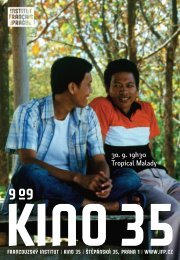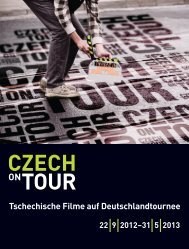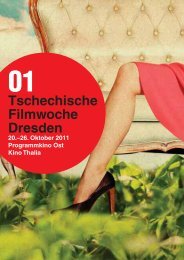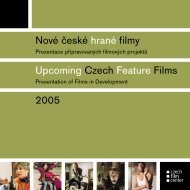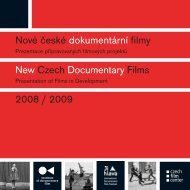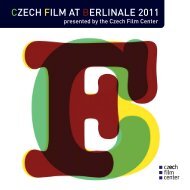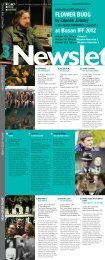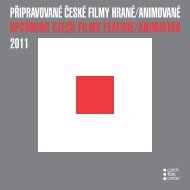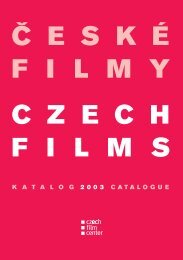Create successful ePaper yourself
Turn your PDF publications into a flip-book with our unique Google optimized e-Paper software.
INTERVIEW<br />
INTERVIEW<br />
TELEGRAM<br />
FILM COMMISSION NEWS<br />
INTERNATIONAL FESTIVALS 2011<br />
Q & A WITH<br />
PAVEL STRNAD<br />
An interview with producer Pavel Strnad, who is<br />
behind the first <strong>Czech</strong> animated film that originated<br />
using rotoscopic technology, Alois Nebel, which<br />
will have its international premiere in the official<br />
programme at the 2011 Venice IFF.<br />
How important is the selection of your film by the Venice <strong>Film</strong> Festival?<br />
Of course we are honoured that the world premiere of Alois Nebel will be at<br />
a festival with such a great tradition. Our previous films, A Country Teacher and<br />
Return of the Idiot were also shown here, but Alois Nebel is the first film in the<br />
Official Selection of the Venice <strong>Film</strong> Festival. And I hope that the Gala Screening<br />
in Venice will be an excellent launching pad for the international distribution of<br />
Alois Nebel. Germany-based The Match Factory, which has extensive experience<br />
with similar types of productions, is selling the film. Their slate includes, for<br />
example, the very successful animated film Waltz With Bashir.<br />
Why did you decide to adapt this graphic novel as an animated film?<br />
I remember that I talked to the authors of the comic book, Jaroslav Rudiš and<br />
Jaromír 99, at the <strong>Czech</strong> Literary Awards, Magnesia Litera, and we were joking that<br />
if Hollywood made a film out of Frank Miller’s Sin City, then we should do the same<br />
with Alois Nebel. Later, when we decided that we<br />
really would do it and we were looking for the<br />
best way to adapt the comics, one possibility was<br />
to make a live-action film and then morph it in the<br />
post-production to get the right “comics look“. But<br />
we really wanted to keep the visual style of the<br />
original comic book and we found rotoscoping, an<br />
animation technology which was used in the film<br />
A Scanner Darkly by Richard Linklater, for example.<br />
We made a short test and it was immediately<br />
clear that it’s the right way to do it.<br />
How demanding was the production?<br />
First, we shot the whole film with the actors. We<br />
were shooting on RED and we tried to shoot as<br />
many scenes on locations as possible. The first<br />
test showed that combining the real background<br />
with drawn animation gives a magical impression.<br />
<strong>Czech</strong> producer Karla Stojáková was selected to take part in the Producer’s<br />
Lab, a networking and co-production program from 7–10 September 2011, during<br />
the Toronto International <strong>Film</strong> Festival. Created by European <strong>Film</strong> Promotion (EFP)<br />
in collaboration with the Ontario Media Development Corporation (OMDC) and the<br />
Toronto International <strong>Film</strong> Festival® (TIFF), the platform encourages European and<br />
Canadian producers to develop partnerships on film projects with both a high<br />
artistic and commercial value.<br />
Karla Stojáková’s Biography<br />
A graduate in <strong>Film</strong> Production at Prague’s <strong>Film</strong> Faculty –<br />
Academy of Performing Arts (FAMU) she co-founded<br />
Axman Production in 2000 to make feature films,<br />
documentaries and short films for a wide international<br />
market. She made her first foray into producing feature<br />
films with Julius Ševčík’s Restart in 2005 and has also<br />
co-produced such successful festival films as Norwegian<br />
director Lilja Ingolfsdottir’s Oblivion or Icelandic filmmaker Grimur Hakonarson’s<br />
Slávek The Shit or Jeanne Rektorik’s short film Orloj.<br />
In 2009, her production of Ševčík’s feature film Normal – The Düsseldorf Ripper<br />
won the Best Director Award at the Shanghai International <strong>Film</strong> Festival.<br />
In addition, Karla has line-produced for Korean feature films, TV dramas and<br />
music videos and provided film services for foreign productions in the <strong>Czech</strong><br />
Republic. She is also the founder of the first film festival on Asian cinema in<br />
Prague – FILMASIA.<br />
Director Žofie Zajíčková’s short film Domino, which originated as a production<br />
of the Zlín film school in 2010, is among the 12 films in the competition section of<br />
the 19th annual TOKYO KINDER FILM children’s film festival in Japan. The director<br />
will personally be participating in the festival in Tokyo as one of the 5 officially<br />
invited international guests. The TOKYO KINDER FILM festival was established in<br />
1992 and will take place this year from 18–21 August. It is one of the three large<br />
international children’s festivals, with over 8 thousand people viewing the 24 films<br />
being shown last year, 9 of which were included in the competition.<br />
CURRENTLY IN PRODUCTION<br />
Several international TV films and series are currently being shot in the <strong>Czech</strong><br />
Republic. The shooting of the ten-episode American TV series Missing is<br />
underway in Prague and surroundings until October. The story centres around<br />
a mother, played by Ashley Judd, who is searching throughout Europe for her<br />
missing son. Events soon show that she is a CIA agent. The crew will spend more<br />
than 90 days shooting in the <strong>Czech</strong> Republic along with a few days in Croatia and<br />
in Istanbul. The series is being produced by ABC Studios, which primarily chose<br />
the <strong>Czech</strong> Republic thanks to incentives, also provided to television projects.<br />
Stillking <strong>Film</strong>s is the local partner.<br />
The sets have been put up on the lot and in the studios of Barrandov Studios for<br />
the two-part French TV film Merlin l’enchanteur (Merlin the Magician), which<br />
GMT Productions, in a coproduction with the <strong>Czech</strong> Republic’s OKKO Productions,<br />
has been filming here from the middle of July until the middle of September. It<br />
takes the well-known story of Merlin the magician (Gérard Jugnot), this time told<br />
in a somewhat lighter form, in the family comedy genre. The French production<br />
Prachovské Rocks Kokořín Castle<br />
We filmed the exteriors of the train station in the Jeseniky Mountains, we shot in<br />
Prague’s Main Station with period trains, etc. Most of the interior scenes were<br />
shot in the Barrandov Studio where we built the sets of Alois’ apartment, the<br />
psychiatric hospital, the pub and others. Only the scenes for which locations<br />
weren’t available anymore, such as the Prague Main Station Hall as it looked in<br />
1989, were filmed on a green screen. Actors had to wear white makeup with black<br />
wrinkles so that animators could more easily redraw their expressions and some<br />
of them looked really horrific...<br />
The shooting took about 35 filming days while the animation took almost two<br />
years. In November 2007 we started with the test shooting and the film was<br />
finished only a few weeks before the world premiere in Venice in August 2011.<br />
What was your experience with first-time director Tomáš Luňák?<br />
When we were looking for a director for such a specific type of film, Jaromír 99,<br />
the designer who is also a singer in a rock band,<br />
recommended Tomáš Luňák who made a music<br />
clip for them where he combined live action and<br />
animation. I wasn’t sure if it was too risky to<br />
have a first-time director, but Tomáš showed<br />
a wonderful feeling for the story and he was also<br />
very strong on the script, so I knew he could do it.<br />
It was an extremely difficult project, but he<br />
stayed focused from the beginning to the very<br />
end of the production. You have to realise that<br />
we only had the chance to watch the complete<br />
film, with all the animations, vfx, and so on, at<br />
the very end of the production, after almost four<br />
years. I think that Tomáš deserves a lot of credit<br />
not only for the huge amount of work that he put<br />
into the film, but first of all for the excellent<br />
artistic result. And I believe the audience will<br />
appreciate it.<br />
A new <strong>Czech</strong> family film is about to be born. Producer<br />
Petr Oukropec is just putting the finishing touches on<br />
the film Blue Tiger. The film is originating under the<br />
production of Negativ as the directorial debut of one of<br />
the leading <strong>Czech</strong> producers, Petr Oukropec, who is the<br />
producer behind, for example, the award-winning films<br />
Return of the Idiot, Night Owls and director Bohdan<br />
Sláma’s A Country Teacher. In this case Sláma is providing<br />
directorial and dramaturgical supervision for his long-standing producer. The<br />
filmmakers want to continue in the former tradition of treasured <strong>Czech</strong> children’s<br />
films, which have disappeared from <strong>Czech</strong> cinematography in recent years. The<br />
film is an adaption of a successful children’s book, Blue Tiger by author Tereza<br />
Horváthová, and it tells the story of a mysterious garden in the middle of a town,<br />
a garden that is to be destroyed to make way for the planned construction of an<br />
amusement centre. The town is controlled by Mayor Rýp, who is fighting against<br />
the garden. But then a Blue Tiger appears… The film is coproduced by German<br />
Blinker <strong>Film</strong>produktion and Slovak Arina with a budget of 1.6 mil. Euro, is planned<br />
to hit cinemas at the end of February 2012.<br />
Bohdan Sláma (A Country Teacher),<br />
winner of a <strong>Czech</strong> Lion award and the<br />
Main Prize at the International <strong>Film</strong><br />
Festival in San Sebastian for the film<br />
Something like Happiness, is in<br />
postproduction of his new film Four<br />
Suns. An amusing family drama about<br />
reconciliation with the reality of<br />
unfulfilled dreams and the desire to change one’s life for the better. The main role<br />
of the father that refuses to grow up and learn from his own mistakes was<br />
entrusted to Jaroslav Plesl, while Anna Geislerová (Innocence, Identity Card) and<br />
Karel Roden (Lidice, Alois Nebel) appear in supporting roles. The film, produced by<br />
Negativ, will be released to <strong>Czech</strong> cinemas in March 2012. Four Suns is being<br />
co-produced by Germany’s Pallas <strong>Film</strong> and <strong>Czech</strong> Television.<br />
brought the minimum filming crew of thirteen people, hiring another hundred<br />
locally. Another few dozen <strong>Czech</strong> workers contributed to the preparatory work<br />
such as the construction of sets, props and costumes. In addition to the filming in<br />
the studios, the crew has also gone to natural exteriors in the <strong>Czech</strong> Republic such<br />
as the renowned Prachovské Rocks in Bohemian Paradise. The film is meant for<br />
the TF1 television station, which will show it in 2012.<br />
Television films, take three: The film Die Kastellanin (The Castellan), the story of<br />
a young woman Marie (Alexandra Neldel) set at the beginning of the 15th century,<br />
is being made for the German SAT1 television station and Austria’s ORF. Of course,<br />
the roughly 100-member crew (70% of which is local) is filming primarily at<br />
historical locations: the Křivoklát, Točník and Kokořín castles. The production is<br />
being arranged by Germany’s TV60 München in coproduction with the <strong>Czech</strong><br />
Republic’s Wilma <strong>Film</strong> and Barrandov Studios. The film follows the successful<br />
TV film Die Wanderhure (The Whore), which was the most successful show broadcast<br />
on the SAT1 station in 2010, when it was viewed by over 10 million viewers.<br />
CZECH FILM AT INTERNATIONAL FILM FESTIVALS 2011<br />
<strong>ALOIS</strong> <strong>NEBEL</strong><br />
<strong>ALOIS</strong> <strong>NEBEL</strong><br />
D: Tomáš Luňák<br />
CZ, DE, SK 2011 | animation | 80 min | 35 mm<br />
36 th TORONTO INTERNATIONAL<br />
FILM FESTIVAL<br />
08.–18. 09. 2011, Canada<br />
Section – Discovery<br />
68 th VENICE INTERNATIONAL<br />
FILM FESTIVAL<br />
31. 08. –10. 09. 2011, Italy<br />
Section – Out of Comptetition<br />
36 th TORONTO INTERNATIONAL<br />
FILM FESTIVAL<br />
08.–18. 09. 2011, Canada<br />
Section – Contemporary World Cinema<br />
CIGÁN<br />
GYPSY<br />
D: Martin Šulík<br />
SK, CZ 2011 | feature | 100 min | 35 mm, DCP<br />
More info at www.filmcommission.cz<br />
52 nd THESSALONIKI<br />
INTERNATIONAL FILM FESTIVAL<br />
04.–13. 11. 2011, Greece<br />
Section – International Competition<br />
OSMDESÁT DOPISŮ<br />
EIGHTY LETTERS<br />
D: Václav Kadrnka<br />
CZ 2011 | feature | 75 min | 35 mm



